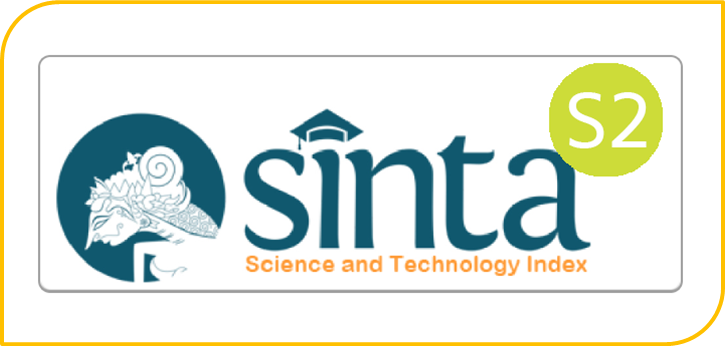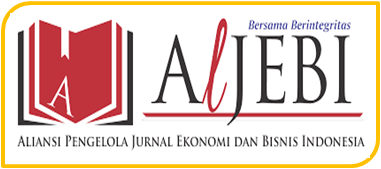GOOD CORPORATE GOVERNANCE DISCLOSURES AND FINANCIAL PERFORMANCE: ISLAMIC SOCIAL REPORTING AND ZAKAH DISCLOSURES AS MEDIATING
Abstract
This study examines the effect of good corporate governance (GCG) disclosure on financial performance proxied by Return on Assets. In addition, this study also aims to examine the mediating role of Islamic social reporting (ISR) disclosure and zakat disclosure on the financial performance of Islamic commercial banks (BUS). As a BUS, there is a responsibility to comply with zakat disclosure, not just ISR disclosure as stipulated rules. The quantitative research method with the selected research sample is all BUS registered on the IDX from 2018 to 2021. Data is processed using AMOS, where test results show that GCG disclosure directly affects ISR and zakat disclosure. ISR disclosure affects financial performance. Zakat disclosure does not affect financial performance. Indirectly, GCG disclosure affects financial performance through ISR disclosure. However, GCG disclosure does not affect financial performance through zakat disclosure. The implications of the results of this study show that GCG disclosure has a significant impact on company management to comply with reporting and disclosing ISR and zakat. This disclosure effort is a way for the company to convey information that the company has obediently carried out the provisions set as a BUS and can provide positive signals to the public to increase trust and impact company profitability.
Keywords
Full Text:
PDFReferences
Abdou, H. A., Ali, K., & Lister, R. J. (2014). A comparative study of Takaful and conventional insurance : empirical evidence from the Malaysian market. Insurance Market and Companies: Analyses and Actuarial Computations, 4(1), 23–35.
Al-Malkawi, H.-A. N., & Javaid, S. (2018). Corporate social responsibility and financial performance in Saudi Arabia. Managerial Finance, 44(6), 648–664. https://doi.org/10.1108/MF-12-2016-0366
Ardian, N. K., & Adityawarman. (2015). Pengungkapan Syariah Pada Bank Syariah Di Indonesia. Diponegoro Journal Of Accounting, 4(3), 1–11. https://doi.org/10.31002/rak.v5i1.2717
Arshad, R., Othman, S., & Othman, R. (2012). Islamic Corporate Social Responsibility Corporate Reputation and Performance. Proceedings of World Academy of Science, Engineering and Technology, 6(64), 1070. http://search.proquest.com/docview/1349445808?accountid=26646
Bilbao-Terol, A., Arenas-Parra, M., Cañal-Fernández, V., & Bilbao-Terol, C. (2016). Multi-criteria decision making for choosing socially responsible investment within a behavioural portfolio theory framework: a new way of investing into a crisis environment. Annals of Operations Research, 247(2), 549–580. https://doi.org/10.1007/s10479-015-1947-9
Chemala, M. Y. R., Abdullah, M. F., & Cantika, B. (2019). Analisis Determinan Profitabilitas Bank Syariah Di Asean (Indonesia, Malaysia, Brunei Darussalam). Jurnal Ilmu Ekonomi (JIE), 3(1), 101–114. https://ejournal.umm.ac.id/index.php/jie/article/view/9546/8781
Dusuki, A. W. (2010). Do equity-based Sukuk structures in Islamic capital markets manifest the objectives of Shariah? Journal of Financial Services Marketing, 15, 203–214.
https://doi.org/https://doi.org/10.1057/fsm.2010.17
Eliana, E., Astuti, I. N., Nurbismi, N., & Riza, A. (2020). Pengaruh Pengeluaran Zakat Perbankan, Ukuran Perusahaan dan Islamic Social Responsibility (ISR)Terhadap Profitabilitas pada Bank Umum Syariah di Indonesia Periode 2016-2019. Jurnal EMT KITA, 4(2), 96. https://doi.org/10.35870/emt.v4i2.145
Hashim, F., Mahadi, N. D., & Amran, A. (2015). Corporate Governance and Sustainability Practices in Islamic Financial Institutions: The Role of Country of Origin. Procedia Economics and Finance, 31(15), 36–43. https://doi.org/10.1016/s2212-5671(15)01129-6
Hebb, T., Louche, C., & Hachigian, H. (2014). "Exploring the societal impacts of SRI", Socially Responsible Investment in the 21st Century: Does it Make a Difference for Society? Emerald Group Publishing Limited. https://doi.org/https://doi.org/10.1108/S2043905920140000007001
Indriastuti, M., & Najihah, N. (2020). Improving Financial Performance Through Islamic Corporate Social Responsibility and Islamic Corporate Governance. Jurnal Riset Akuntansi Dan Bisnis Airlangga, 5(1), 818. https://doi.org/10.31093/jraba.v5i1.206
Jihadi, M., Vilantika, E., Widagdo, B., Sholichah, F., & Bachtiar, Y. (2021). Islamic social reporting on value of the firm: Evidence from Indonesia Sharia Stock Index. Cogent Business and Management, 8(1)
https://doi.org/10.1080/23311975.2021.1920116
Junkus, J., & Berry, T. D. (2015). Socially responsible investing: a review of the critical issues. Managerial Finance, 41(11), 1176–1201. https://doi.org/10.1108/MF-12-2014-0307
Kasih, M. C., & Dewi, V. S. (2021). Does financial performance moderate Islamic Corporate Governance and Islamic Social Reporting? Jurnal Ilmiah Ekonomi Islam, 7(3), 1561–1572
https://jurnal.stie-aas.ac.id/index.php/jei/article/view/2886
Kumalasari, D., & Pratikto, H. (2018). Good Corporate Governance Affects on Corporate Value Through Return on Equity and Return on Asset of Manufacture Company. KnE Social Sciences, 3(3), 114.
https://doi.org/10.18502/kss.v3i3.1878
Lidyah, I., Amir, A., Yacob, S., & Rahayu, S. (2019). The Effect Of Board Of Director, Board Of Commissioner And Audit Committee On Value Of Firm To Islamic Social Reporting As A Mediating Variable. Journal Of Business Studies And Mangement Review, 2(2), 82–87.
https://doi.org/10.22437/jb.v2i2.7214
Mahrani, M., & Soewarno, N. (2018). The effect of good corporate governance mechanism and corporate social responsibility on financial performance with earnings management as mediating variable. Asian Journal of Accounting Research, 3(1), 41–60.
https://doi.org/10.1108/AJAR-06-2018-0008
Nurhayati, P., & Rustiningrum, D. S. (2021). Implikasi Zakat dan Islamic Social Reporting Terhadap Kinerja Keuangan Pada. JIEI : Jurnal Ilmiah Ekonomi Islam, 7(03), 1416–1424.
https://www.jurnal.stie-s.ac.id/index.php/jei/article/view/3168/1612
Nurhayati, P., Sari, E. W., Pratiwi, D. N., & Shabira, A. R. (2022). Peran Profitabilitas Dalam Hubungan Good Corporate Governance dan Efisiensi Biaya Terhadap Islamic Social Reporting. Jurnal Ilmiah Ekonomi …, 8(02), 1823–1831.
Prihatiningsih, L., & Hayati, N. (2021). Pengaruh Good Corporate Governance dan Kinerja Keuangan Terhadap Pengungkapan Islamic Social Reporting. Jrak, 12(2581–2343), 01–19.
https://jurnal.unismabekasi.ac.id/index.php/jrak/article/download/2470/1822
Purnama, H. K., & Trisnaningsih, S. (2021). Pengaruh Good Corporate Governance Terhadap Profitabilitas Dengan Pengungkapan Tanggung Jawab Sosial Perusahaan Sebagai Variabel Intervening Pada Perusahaan LQ 45 Yang Terdaftar Di Bursa Efek Indonesia. Proceeding of National Conference On Accounting & Finance, 3(18), 107–117.
https://doi.org/10.20885/ncaf.vol3.art10
Qoyum, A., Sakti, M. R. P., Thaker, H. M. T., & AlHashfi, R. U. (2022). Does the islamic label indicate good environmental, social, and governance (ESG) performance? Evidence from sharia-compliant firms in Indonesia and Malaysia. Borsa Istanbul Review, 22(2), 306–320. https://doi.org/10.1016/j.bir.2021.06.001
Ramdhaningsih, A., & Utama, I. M. K. (2013). Pengaruh Indikator Good Corporate Governance Dan Profitabilitas Pada Pengungkapan Corporate Social Responsibility. E-Jurnal Akuntansi, 3(2), 368–386.
https://ojs.unud.ac.id/index.php/akuntansi/article/view/5515
Rivai, V., & Basri, A. F. (2004). Performance Appraisal: Sistem yang Tepat untuk Menilai Kinerja Karyawan dan Meningkatkan Daya Saing. PT Grafindo Persada.
Samad, K. A., & Said, R. (2016). Zakat Disclosure by Malaysian Islamic Banks. International Business Management, 10(20), 4737–4742.
Sarafina, S., & Saifi, M. (2017). Pengaruh Good Corporate Governance Terhadap Kinerja Keuangan dan Nilai Perusahaan. Jurnal Administrasi Bisnis (JAB), 50(3), 108–117. http://eprints.stiei-kayutangi-bjm.ac.id/1146/
Sari, M. S., & Helmayunita, N. (2019). Pengaruh Good Corporate Governance Terhadap Pengungkapan Islamic Social Reporting. Jurnal Eksplorasi Akuntansi, 1(2), 751–768.
https://doi.org/10.24036/jea.v1i2.108
Sawmar, A. A., & Mohammed, M. O. (2021). Enhancing zakat compliance through good governance: a conceptual framework. ISRA International Journal of Islamic Finance, 13(1), 136–154.
https://doi.org/10.1108/IJIF-10-2018-0116
Sidik, I., & Reskino. (2016). Zakat and Islamic Corporate Social Responsibility: Do These the Performance of Shariah Banks? Shirkah: Journal of Economics and Business, 1(2), 161–184.
Susbiyani, A., Halim, M., & Animah, A. (2022). Determinants of Islamic social reporting disclosure and its effect on firm's value. Journal of Islamic Accounting and Business Research.
https://doi.org/10.1108/JIABR-10-2021-0277
Syurmita, S., & Fircarina, M. J. (2020). Pengaruh Zakat, Islamic Corporate Social Responsibility dan Penerapan Good Governance Bisnis Syariah terhadap Reputasi dan Kinerja Bank Umum Syariah di Indonesia. Jurnal Al Azhar Indonesia Seri Ilmu Sosial, 1(2), 87.
https://doi.org/10.36722/jaiss.v1i2.463
Wardiwiyono, S., & Jayanti, A. F. (2021). Peran Islamic Corporate Social Responsibility dalam Memoderasi Pengaruh Zakat Terhadap Kinerja Bank Umum Syariah. JURNAL AKUNTANSI DAN KEUANGAN ISLAM, 9(1), 73–89. https://doi.org/10.35836/jakis.v9i1.241
Wijayanti, R., & Setiawan, D. (2022). Social Reporting by Islamic Banks: The Role of Sharia Supervisory Board and the Effect on Firm Performance. Sustainability (Switzerland), 14(17), 1–25.
https://doi.org/10.3390/su141710965
Xue, S., Qi, C., & Xu, J. (2023). The effect of voluntary and mandatory corporate social responsibility disclosure on firm profitability: Evidence from China. Pacific-Basin Finance Journal, 77.
https://doi.org/https://doi.org/10.1016/j.pacfin.2022.101919
DOI: https://doi.org/10.18860/ed.v11i1.20491
Refbacks
- There are currently no refbacks.
Editorial Office:
Megawati Soekarnoputri Building
Faculty of Economics
E-mail: eldinar@uin-malang.ac.id
Universitas Islam Negeri Maulana Malik Ibrahim Malang
E-ISSN 2622-0083

El Dinar under a CC BY SA 4.0 International License.
Member of:
Indexed By:
















